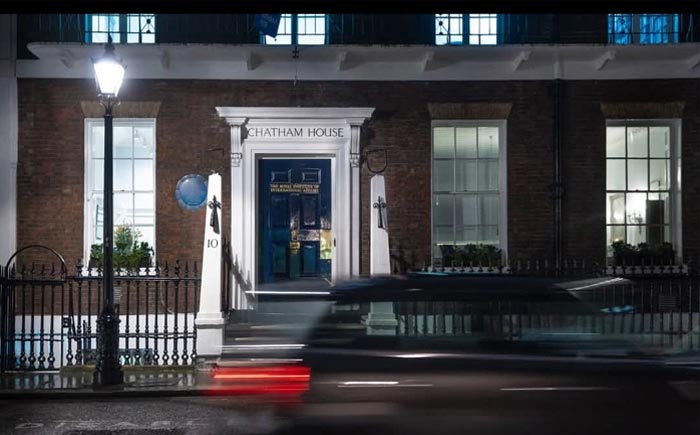
In a recent analysis, the UK-based think tank Chatham House has issued a stark warning about the pervasive issue of corruption in Nigeria. According to their latest insights, corruption is not only hindering the country's economic advancement but also deeply undermining public confidence in institutions. This comes amid ongoing challenges such as inadequate funding for anti-corruption bodies and significant political interference. As Nigeria marks 25 years since the end of military rule, these findings highlight the uneven progress in combating graft and the urgent need for renewed efforts to foster sustainable development.
Chatham House, formally known as the Royal Institute of International Affairs, is a respected independent policy institute that provides in-depth research on global issues. Their recent publication on corruption in Nigeria, released in August 2025, draws from extensive analysis and surveys to underscore how entrenched corrupt practices are impeding progress. The report, authored by experts including Dr. Leena Hoffmann and Tommy Hilton, builds on earlier work, such as a March 2025 paper examining anti-corruption efforts over the past quarter-century. It paints a picture of a nation rich in potential but held back by systemic flaws.
Nigeria, with the fourth-largest economy in Africa by GDP, should be a beacon of prosperity on the continent. However, its GDP per capita remains among the lowest, reflecting the stark inequalities exacerbated by corruption. The report ranks Nigeria among the world's 40 most corrupt countries on the Corruption Perceptions Index and 35th from the bottom on the World Bank's control of corruption list. These metrics illustrate a broader governance failure, placing the country 33rd in Africa according to the Mo Ibrahim Index.
At the heart of Chatham House's warning is the direct link between corruption and stalled economic growth. Corrupt practices divert public resources away from essential sectors like education, healthcare, and infrastructure. This misallocation fuels poverty, with approximately 54 percent of Nigerians living below the poverty line. Instead of investing in productive areas that could drive job creation and innovation, funds are siphoned off through embezzlement, bribery, and procurement fraud.
For instance, corruption in public administration and politics leads to inflated contracts and ghost projects, where money is allocated but little to no work is done. This not only wastes billions but also discourages foreign investment, as investors seek environments with transparency and accountability. The result is a vicious cycle: poor infrastructure hampers business operations, reduces productivity, and limits economic expansion. Chatham House notes that despite natural resources like oil, Nigeria's economy has not translated into widespread prosperity, largely due to these corrupt diversions.
Moreover, the report connects corruption to broader economic woes, including rising living costs and security issues. When public funds are misused, it exacerbates inflation and unemployment, particularly affecting the youth who make up a significant portion of the population. This economic stagnation has long-term implications, potentially trapping future generations in poverty.
Beyond economics, corruption is eroding public trust at an alarming rate. Chatham House's findings reveal that institutions such as the police, judiciary, and even the presidency are viewed with deep suspicion. A survey conducted in partnership with the National Bureau of Statistics shows that 46 percent of respondents greatly distrust the police, making it the most distrusted institution, while only 7 percent express strong trust. The presidency and federal government fare little better, with 36 percent and 35 percent distrust rates, respectively.
This lack of faith stems from perceptions of inefficiency, non-transparency, and political capture. The justice system, for example, is seen as slow and biased, allowing the powerful to evade accountability while ordinary citizens face harsh treatment. Such disparities foster a culture of impunity, where corruption is viewed as a low-risk activity for those with connections. Many Nigerians believe that honesty is unrewarded in a system rigged against them, leading to widespread frustration.
The consequences are profound. Eroded trust contributes to social unrest, including protests, political violence, and even extremist insurgencies. It also drives emigration, often referred to as the "japa" phenomenon, where talented youth leave the country in search of better opportunities. Furthermore, low trust complicates government initiatives, such as tax reforms, as citizens are reluctant to contribute without assurance that funds will be used properly.
Chatham House emphasizes that these issues persist amid poor funding and interference in anti-corruption mechanisms. Since 1999, Nigeria has established bodies like the Independent Corrupt Practices and Other Related Offences Commission (ICPC) and the Economic and Financial Crimes Commission (EFCC). However, these agencies suffer from insufficient resources, limiting their ability to investigate and prosecute effectively.
Political interference further compounds the problem. Agencies are often used as tools against opposition figures, while allies of those in power escape scrutiny.

Story by - Nimi Jack
Lagos, Nigeria.
+234 913 161 4181
+234 803 961 8550
+234 802 321 3873
info@pepperroom.com.ng
© 2025 | 🌶️Pepper-Room - Everything Loud, Wild, and Worth Talking About. | All Rights Reserved.
Pepper-Room is not responsible for the content of external sites.